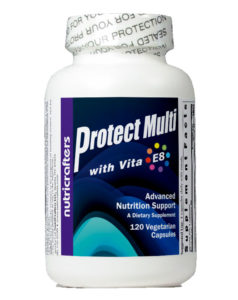Multivitamin use and longevity
Rsearchers from the National Institute for Environmental Health Sciences published a study in the American Journal of Clinical Nutrition that showed women who consume a daily multivitamin have longer chromosome telomeres than those who don’t. Telomeres are the caps at the end of DNA chromosomes and their length is associated with biological aging. The longer the telomere, the younger the DNA chromosome, and thus a biologically younger person who has a statistically higher chance at longevity.
The researchers believe that because multivitamin supplements represent a major source of micronutrients, they may affect telomere length by modulating oxidative stress and chronic inflammation.
The longevity science behind telomere length and biological aging won the 2009 Nobel Prize in Medicine, so to find out that the simple daily use of a multivitamin supplement can protect telomere length is a real health breakthrough. “This study provides the first epidemiologic evidence that multivitamin use is associated with longer telomere length among women,” said the researchers.1
Another 2009 study that supports the use of multivitamin supplements for longevity was published by researchers from the University of Washington, Seattle. Their study surveyed more than 70,000 Washington State residents aged 50–76 to determine mortality rates in multivitamin users. In their follow up after 5 years they found that people who had taken multivitamins consistently for the previous 10 years had a decreased risk of mortality from cardiovascular disease.2
Blood pressure, body weight and cataracts
While the fact that multivitamins can help you live a longer, healthier life is paramount, other studies have shown multivitamins are beneficial for other health issues.
Researchers in China found that multivitamin supplements helped reduce blood pressure in obese women with increased cardiovascular disease risk. The researchers gave 128 women aged 18–55 years either a high-dose multivitamin and mineral supplement or an identical placebo each day during the 26 week study. At the end, the group that received the multivitamin had significantly lower blood pressure as well as lower serum levels of C-reactive protein—a measure of inflammation and a risk factor in cardiovascular disease.
“Our results showed that supplementation with adequate multivitamin and mineral supplements could reduce blood pressure and serum C-reactive protein in obese women with increased cardiovascular disease risk,” said the researchers.3
Another study published in the British Journal of Nutrition looked at the health benefits of multivitamin supplements on maintaining healthy weight. This study found that women who consumed multivitamins as part of a weight reduction product scored lower on “hunger tests” and had less appetite, which could lead to weight loss success.
And to further show the diversity of health benefits from multivitamins, a study by Italian researchers called the Italian-American Clinical Trial of Nutritional Supplements and Age-related Cataract (CTNS), looked at plasma levels in beneficial eye health nutrients in people who received a multivitamin supplement as part of their study. What they found was that participants assigned to receive the multivitamin showed a significant increase in plasma levels of vitamin E, beta-carotene, folate, and vitamin B12, and an improved riboflavin status when compared with participants assigned to placebo.4 Each of these nutrients has been identified as playing an important role in eye health.
2010 multivitamin studies
The first study of 2010 to show the disease prevention properties of multivitamin supplements was published in the January 2010 issue of Cancer Research by a team of scientists from the University of New Mexico.
This study found that multivitamin supplements have the ability to protect smokers from lung cancer. The researchers looked at the prevalence of the gene promoter methylation, a marker for the early detection of lung cancer, and found that smokers who took multivitamin supplements had higher levels of protection against methylation. The researchers concluded that, “Novel interventions to prevent lung cancer should be developed based on the ability of diet and dietary supplements to affect reprogramming of the epigenome.”5
Another study, this one published in March 2010 by researchers from the Arizona Center for Integrative Medicine at University of Arizona, looked at the importance of nutrition in mental health. This study suggested that food and mood are inexorably linked and that dietary supplements, including multivitamins, are an important part of mental health. “Many patients will benefit from the use of specific dietary supplements, such as a multivitamin-mineral high in B-vitamins and omega-3 fatty acids. And no matter what the underlying cause of the mood disorder, patients should be counseled about the relationship between food and mood, for the evidence now substantiates what laypeople and medical professionals have long known intuitively: the way we eat affects the way we feel,” explained the researchers.6
Finally, a study to show the power of the micro-nutrients found in a high quality multivitamin supplement was published in the November 2010 edition of the American Journal of Clinical Nutrition. This study, which began in 1997, looked at the power of multivitamins to prevent myocardial infarction, a form of heart disease, in women. What these researchers found is that long-term multivitamin use was associated with a lower risk of myocardial infarction in women with no history of cardiovascular disease compared to those who did not use multivitamin supplements.7
Clearly, the use of multivitamin supplements to prevent essential nutrient deficiency and ward off disease, something long suspected by many people but rejected by the medical community for lack of proof, is finally getting its time in the sun. The humble multivitamin is finally getting the respect it deserves.
